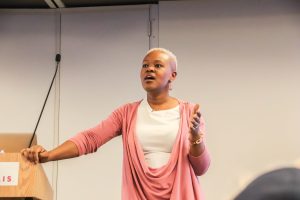Executive Coach and Physician at HeartWork Leslie Nwoke presented a lecture to help break down biases at the University of Indianapolis titled “How to Face What (or who) Scares You: A Conversation on Bias” on Nov. 28. This lecture was hosted by the Office of Student Affairs and was a part of UIndy’s Diversity Lecture Series. Nwoke lives in Atlanta, Ga. but makes a career of traveling to different campuses across the United States to give a variety of lectures on bias.
Executive Coach and Physician Leslie Nwoke presented “How to Face What (or who) Scares You: A Conversation on Bias” and discussed growing up Nigerian-American as well as how to identify biases that people may have. She also gave tips on how to combat those biases and start conversations to take steps to break down biases.
Nwoke began her lecture by discussing her own personal experiences with bias, which included a story from when she was a little girl. She and her family were questioned if they were really Christian because of a poster on their van promoting the Clinton/Gore campaign. She said she was hurt that someone would question her and her family’s faith without even knowing them, based on who they were voting for in the election. She said she grew from this situation and started to look more into biases that she had against other people, and biases people might have against her.
However, Nwoke said that bias as an individual is looking at one piece of the story and then inserting their own thoughts to fill in the gaps. This then results in full story the individual believes to be the truth.
Nwoke said that because of her experience with bias, she has dedicated much of her life to breaking down these barriers through education.
“We’re seeing people suffer because of other people’s biases,” Nwoke said. “It’s important that this conversation goes on a national scale so that it can create conversations in our own home as well.”
During the rest of her lecture, Nwoke taught different types of bias, how to identify biases and where owning those biases can lead. She said that there are two different types of biases that an individual can have, implicit bias and explicit bias.
Nwoke said that the difference between the two is simply whether or not the bias was a conscious decision. Implicit bias is in the subconscious, so the individual is not aware of the bias until faced with it. Explicit bias is conscious, so the individual is fully aware of the bias they hold. Then, she said that once an individual owns their biases it can lead to validation, passivity, shame, denial or acceptance.
Concluding her lecture, Nwoke allowed people from the audiences to share their experiences being on both sides of bias. Junior creative writing major Tyrah Chery shared one of her experiences with having a bias toward certain groups of people because of a horrific family experience. She said that since coming to UIndy she has really been able to face her bias head on and work to break it down and move on.
“The most important thing that I took away from that lecture was that I still have biases that I need to breakdown myself,” Chery said. “They are not as bad as the ones I previously had but there are still things that I need to work on myself to understand the people around me and the environments that I’ll be in.”
In her lecture, Nwoke explained that individuals often form biases because they keep people at an arm’s length. She said that to solve this problem, the individual with the bias should slowly start to immerse themselves around people they have the bias toward. The more the individual experiences relating to their bias the more they will get familiar with it and likely start to break it up and get over it.
“One of the easiest ways to form biases about people is when you stay away from them or dehumanize them,” Nwoke said. “So when you get closer to someone you see that they have eyes, ears, and a nose just like you. They have family issues just like you. You may even have the same pair of shoes on. You start seeing similarities between them and yourself, and there’s no other way to see that unless you move closer.”







